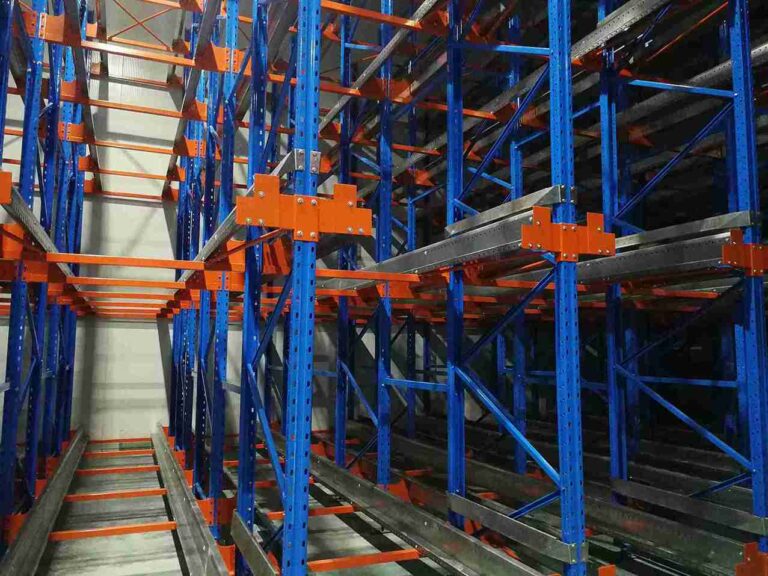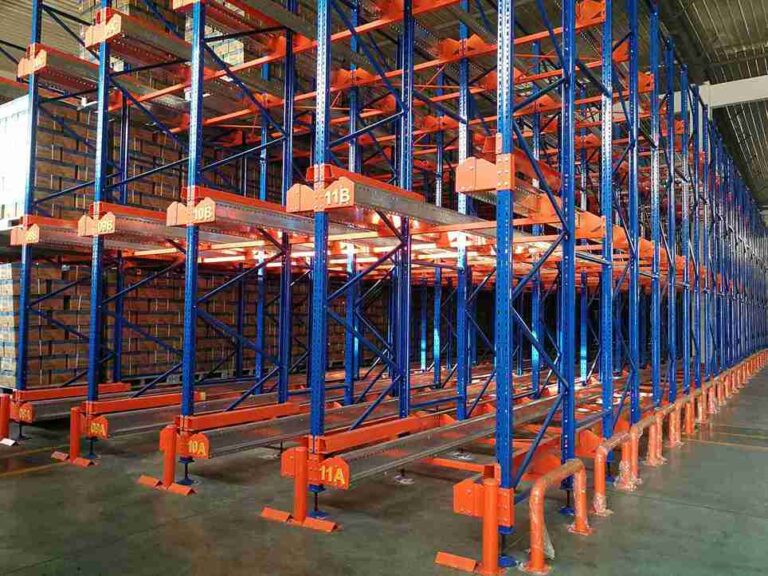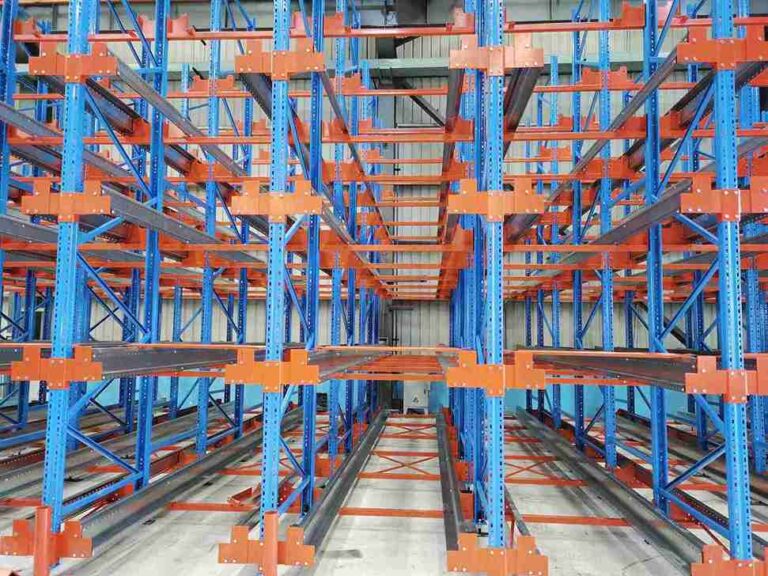📐 "First 50 Enterprise Queries Get Custom 3D Warehouse Design" Plan

shuttle racking space utilization ROI system maximizing warehouse storage density
The Critical Role of Shuttle Racking in Modern Warehousing
In an era where every square foot of warehouse space translates directly to profitability, shuttle racking space utilization ROI has emerged as the gold standard for storage optimization. Companies across industries are discovering that traditional racking systems simply can’t compete with the space-saving precision, cost efficiency, and operational superiority of shuttle racking solutions.
The fundamental advantage of shuttle racking space utilization ROI lies in its ability to transform underutilized vertical and horizontal space into high-density storage zones. Unlike conventional systems that waste valuable floor space on excessive aisles, shuttle racking configurations typically achieve 85-100% storage density improvements, creating immediate ROI impact from day one of implementation.
This comprehensive guide explores how leading warehouses are leveraging shuttle racking space utilization ROI to:
- Double or triple existing storage capacity without facility expansion
- Slash labor costs by 40-60% through semi-automated operations
- Achieve full ROI within 24-36 months through measurable efficiency gains
- Future-proof operations with scalable, adaptable storage infrastructure
H1: The Science Behind Shuttle Racking Space Utilization ROI
H2: How Shuttle Racking Redefines Storage Economics
The shuttle racking space utilization ROI equation begins with its unique mechanical design. By deploying remotely controlled shuttle carts within deep storage lanes, the system eliminates the need for forklifts to enter storage channels. This breakthrough design delivers three fundamental ROI drivers:
- Vertical Space Maximization: Shuttle systems routinely achieve 12-15 meter storage heights, far beyond the practical limits of manual forklift operations.
- Horizontal Density Optimization: With only one access aisle required per 10-30 pallet positions, facilities reclaim 30-50% of floor space previously wasted on aisles.
- Dynamic Storage Flexibility: The same shuttle racking infrastructure can be reconfigured for FIFO, LIFO, or mixed inventory flows, adapting to changing business needs without costly modifications.
H2: The ROI Calculation Framework
Quantifying shuttle racking space utilization ROI requires analyzing both hard and soft cost factors:
Capital Expenditure (CapEx) Components:
- Shuttle equipment investment
- Racking structure costs
- Installation and commissioning
- WMS integration expenses
Operational Expenditure (OpEx) Savings:
- Labor cost reductions (typically 75,000 annually per operator eliminated)
- Energy savings from reduced forklift operation (15-25% lower power consumption)
- Inventory shrinkage reduction (3-7% typical improvement)
- Damage cost avoidance (2-4% of inventory value annually)
Industry benchmarks show that well-implemented shuttle racking space utilization ROI projects achieve:
- 12-18 month payback periods for semi-automated systems
- 24-36 month ROI for fully automated configurations
- 5-7 year total cost of ownership advantages versus conventional racking
H2: Real-World Case Studies Demonstrating Shuttle Racking Space Utilization ROI
H3: Automotive Parts Distributor Achieves 214% ROI
A Tier 1 automotive supplier implemented shuttle racking space utilization ROI solutions across their 35,000 sqm regional distribution center. The results:
- Storage capacity increased from 12,000 to 28,000 pallet positions
- Order picking productivity improved by 73%
- Labor costs reduced by $1.2 million annually
- Full system ROI achieved in 22 months
H3: Pharmaceutical Cold Storage Breakthrough
A vaccine manufacturer leveraged shuttle racking space utilization ROI in their -20°C facility to:
- Increase storage density by 92% while maintaining strict FIFO compliance
- Reduce energy consumption by 18% through optimized cold air containment
- Achieve 100% inventory traceability via integrated WMS tracking
- Recoup capital investment in 19 months
H1: Advanced Strategies for Maximizing Shuttle Racking Space Utilization ROI
H2: Hybrid System Configurations
Leading operators are combining shuttle racking space utilization ROI solutions with complementary technologies:
- Mobile racking integration for seasonal volume fluctuations
- Pocket sortation systems for e-commerce fulfillment
- Automated guided vehicle (AGV) interfaces for hands-off pallet transfer
H2: Data-Driven Optimization
Modern shuttle racking space utilization ROI systems generate terabytes of operational data that can be leveraged for:
- Dynamic slotting optimization based on real-time pick patterns
- Predictive maintenance scheduling to maximize equipment uptime
- Throughput capacity modeling for demand forecasting
H2: Sustainability Advantages
Beyond direct financial returns, shuttle racking space utilization ROI delivers environmental benefits:
- 35-50% lower carbon footprint versus conventional racking
- Reduced concrete slab requirements for new facilities
- Energy-efficient LED lighting integration in high-density lanes
H1: The Future of Shuttle Racking Space Utilization ROI
Emerging innovations promise to further enhance shuttle racking space utilization ROI:
- AI-powered shuttle routing algorithms that reduce empty travel by 15-20%
- Autonomous charging systems enabling 24/7 operation
- Blockchain-enabled inventory tracking for enhanced security
- Modular shuttle designs allowing gradual automation scaling
Conclusion: Why Shuttle Racking Delivers Unmatched Space Utilization ROI
The evidence is clear: no other storage solution delivers the combination of space optimization, cost reduction, and operational flexibility offered by shuttle racking space utilization ROI. As warehouses face increasing pressure to do more with less, shuttle racking emerges as the definitive solution for:
- Companies needing to maximize existing facility footprints
- Operations struggling with labor availability and costs
- Businesses requiring future-proof storage infrastructure
- Organizations committed to sustainable logistics practices
With typical shuttle racking space utilization ROI payback periods under three years and ongoing operational savings that compound annually, the business case for adoption has never been stronger. Leading supply chain executives consistently report that shuttle racking implementations rank among their highest-return capital investments – often outperforming more glamorous automation projects in measurable financial impact.
H1: Frequently Asked Questions
H2: How does shuttle racking ROI compare to traditional pallet racking?
Shuttle racking space utilization ROI typically delivers 3-5x greater financial returns over a 10-year period compared to selective racking, with the break-even point occurring within 2-3 years for most installations.
H2: What warehouse characteristics maximize shuttle racking ROI?
Facilities with high inventory turns, consistent pallet dimensions, and medium-to-high storage density requirements see the strongest shuttle racking space utilization ROI. Operations storing 50+ pallets of the same SKU are ideal candidates.
H2: Can shuttle racking ROI be accurately projected before implementation?
Yes, advanced shuttle racking space utilization ROI modeling tools can predict financial outcomes with 90%+ accuracy by analyzing: current labor costs, inventory profiles, facility dimensions, and throughput requirements.
H2: How does shuttle racking ROI change with facility size?
Shuttle racking space utilization ROI scales favorably with size – warehouses under 5,000 pallet positions typically see 18-30 month ROI, while facilities exceeding 20,000 positions often achieve 12-18 month payback periods.
H2: What maintenance factors impact long-term shuttle racking ROI?
Properly maintained shuttle systems sustain optimal ROI performance through: scheduled shuttle battery replacements (every 3-5 years), annual rail alignment checks, and quarterly software updates to maintain peak efficiency.
Welcome to contact us, if you need warehouse rack CAD drawings. We can provide you with warehouse rack planning and design for free. Our email address is: jili@geelyracks.com





